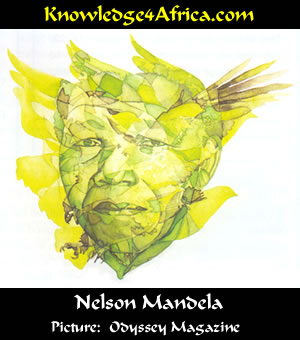|
READ THIS
At face value, the poem is a description of a thunderstorm raging far away over the Magaliesberg
Mountains beyond Pretoria. The poet watches the lightning flash, hears the thunder rumble and tries to
determine from the time that has elapsed just how far away the storm really is.
There is, however, a deeper meaning. The thunderstorm is a reference to the oncoming revolutionary
storm that was heading South Africa's way, an onslaught of discontent caused by the racist attitudes of
the people and the unjust laws of the country.
From the poet's point of view, this storm was still far away but he knew it was getting closer. He could only
hope that everyone would be safe, huddled away within the seclusion of their homes.
 THE POET AND HIS POEM
THE POET AND HIS POEM
Adam Schwartzman, a Jewish South African, was born in Johannesburg in 1973. He had therefore not
yet born when the Rivonia treason trial took place in 1963.
Schwartzman's poem is an almost apocalyptic examination of the political storm that awaited the country
as a result of the trial. It views the crisis of the "liberation struggle" in the 1980s as if still something of the
future.
The poet, an academic who worked for a time at the Centre for African Studies at the University of Cape
Town, has been described as having "a strong sensual perception of South Africa, wrestling with the
heritage of segregation and violence in this country".
There is a Rivonia Road in Sandton but it is hardly likely that the poet is referring to it. Instead, he is most
probably looking at the metaphorical road which led from the Rivonia trial of 1963 and culminated in the
armed struggle of the 1970s and 80s.
On trial were 19 African National Congress leaders who had been arrested at Liliesleaf Farm in July 1963.
These included Nelson Mandela, Walter Sisulu, Govan Mbeki and Raymond Mhlaba.
Originally the death penalty had been requested but this was changed due to world-wide protests.
Instead, eight defendants -- including Nelson Mandela -- were sentenced to life imprisonment.
The trial would be a pivotal point in the history of the liberation movement in South Africa. Indeed, the
ANC evolved from an organisation that had been trying to achieve change through negotiation and then
sabotage into one which sought the absolute overthrow of the racist regime through an armed struggle.
|
TEST YOURSELF!
Read the left column and then answer
the following questions:
"In the suburbs though, it is a dumb-show. We count
the long seconds between flash and wallop and try
to remember the formula to link sight and sound by distance."
- Why should the distant storm be "a dumb-show" in the suburbs? (4)

[Need help?]
A dumb-show is described as "part of a dramatic representation given in pantomime or gestures
without speech". The thunderstorm was still so far away that it was making little noise, and nobody
except the children on the roof would perhaps even have noticed it.
On the other hand, the suburbs were the parts of town where the white people lived. In relation to the
other storm -- the Rivonia treason trial -- the probability is that few of them were even following it. They
knew it was happening but were not particularly concerned with its result. In other words, there was little
noise coming out of the treason trial. It was almost as if it wasn't there.
|
- Explain the "flash and wallop". (2)

[Need help?]
The "flash" is the flash of lightning whereas the "wallop" is the rumble of thunder.
|
- Why would the children "count the long seconds"? (2)

[Need help?]
Counting the seconds between the lightning flash and the rumble of thunder was a way of determining just
how far away the storm was.
|
- Explain the implication of them being "long" seconds? (4)

[Need help?]
Because children were often inclined to count seconds too fast, they were often taught the technique of
saying something like, "One-crocodile-two-crocodile", etc. This would have appeared very slow
and long within the hectic life of a child. Or can you think of another reason?
|
- Can you explain this "formula" about which the poet speaks? (2)

[Need help?]
The formula was this: every 14 seconds between the flash of lightning and the rumble of thunder
represented one mile (1.6km) distance. So 28 seconds meant that the storm was two miles away
(3.2km).
|
"What we see is the storm, small and entire in the wide sky and neatly
defined between two tilted parallels. As they open up nearer,
we will smell them cleanly. We will see through rain-shade."
- What does the poet mean when he says, "What we see is the storm, small and
entire in the wide sky"? (4)

[Need help?]
The horizon from the roof was vast but the children were focussing entirely on the storm, which looked
quite small at that distance away. Not only that, but they could witness the entire storm within that wide
panorama of sky.
|
- Was the storm really "neatly defined"? (2)

[Need help?]
It looked neat because they were so far away. Once the storm came closer, however, it would have
ceased to look so neat but rather filled the entire sky. The Rivonia trial, which is what inspired the poet,
also looked so neat when confined to the courtroom but the political mayhem that was due to be
unleashed could certainly not be said to look in any way neat and under control.
|
- What does the poet mean when he says, "As they open up nearer, we will smell them
cleanly"? (2)

[Need help?]
It is possible that the poet is referring to the very clean smell of ozone released by the lightning.
|
|



